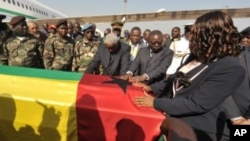Sunday's funeral of President Malam Bacai Sanha in Guinea-Bissau could mark the beginning of a turbulent few months for the politically-troubled West African country.
All flags fly at half-staff in Guinea-Bissau’s capital as Guineans mourn the loss of their president.
Malam Bacai Sanha died on January 9 in a Paris hospital of a prolonged, unspecified illness. He was 64 years old.
Though in office just two years, Sanha was viewed as a head of state who brought relative stability to a country where democracy has proved elusive.
Now, some in the population are feeling unease about what could happen next.
Opposition parties are already protesting at the move by National Assembly leader Raimundo Pereira to step up as interim president. But most citizens support Pereira, who is calling for an election within 60 days.
"Allocating the post of president to the head of the assembly is the constitutional thing to do," said Joao Gomes, a businessman in Bissau. "We want him to make sure the elections are carried out correctly. We need a president who brings peace and makes the country work."
Guinea-Bissau has had a tumultuous political history, with a series of military coups and assassinations during the last three decades.
Mr. Sanha was elected president in July 2009 following the assassination of his predecessor Joao Bernardo Vieria. More recently, a group of soldiers tried to stage a coup in Bissau on December 26.
Richard Antwi, a 30-year-old pastor in Bissau, says people are used to the instability.
“The president before this one - there was an assassination," said Antwi. "They managed to solve the problem, a new one came, and now he’s dead. I mean, they are used to presidents who don’t finish their attempts, but they deal with it, so…”
Ansoumane Sanga, the justice adviser to Pereira, says even if violence breaks out, it would be controlled.
"Of course we have nagging little fears after what happened on the 26th here," he explained. "But even after such an event, the next day everything was normal; everything functioned normally. People understand that we have to carry on."
But Justino Pedro du Silva, a doorman in Bissau, says everyone fears the disruption that such political turmoil brings.
"It is a very difficult to live in the middle of political instability," he said. "When there is violence, people are afraid."
President Sanha had concentrated on trying to heal what had become known as a failed state.
Ansoumane Sanga describes the late president as “a unifier."
"In his two years as president, Sanha listened, understood and reacted," he said. "He always honored us and respected us and he always tried to improve Guinea-Bissau."
The feeling is shared by normal Guineans. Bineta Piero, a 32-year-old maid and student in Bissau, says everyone will be sad at the funeral.
"When we heard that the president had died, everyone was really sorry," she said. "We feel it deep in their hearts because he brought stability and peace to the country. We pray that the new president will be good for Guinea-Bissau."
That sentiment is shared by many who want Guinea-Bissau's political turmoil to be in the past.
Guinea-Bissau Mourns Late President, Looks to Future
- By Jane Labous




